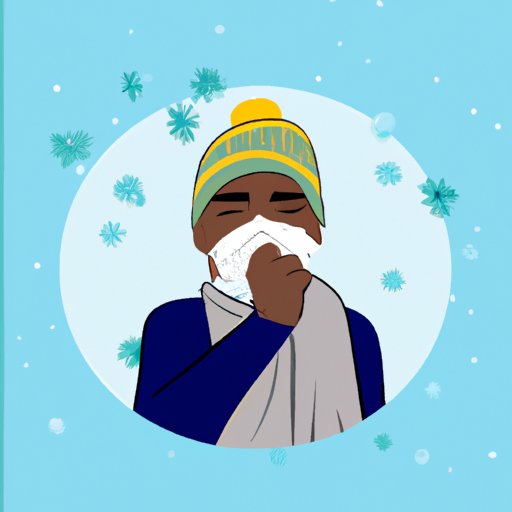Introduction
When you feel sick with a cold or the flu, one of your main concerns is how long you will be contagious and need to stay in isolation. Understanding the science behind how long you’re contagious after an illness can help you make informed decisions about when to stop isolating yourself. This article will explore the science behind how long you are contagious after an illness, when to stop isolating yourself after a cold or flu, when you can return to normal activities, and what to do if you’re still experiencing symptoms after 5 days.
Exploring the Science Behind How Long You’re Contagious After an Illness
The length of time you remain contagious after an illness can vary depending on the type of illness. For example, the common cold typically lasts for 7-10 days, while the flu can last up to two weeks. Some illnesses, such as chickenpox, can be contagious for up to 21 days. Other factors, such as how severe the illness is and how quickly you receive treatment, can also affect how long you remain contagious.
It’s important to note that you may still be contagious even if you don’t have any symptoms. According to Dr. Amesh A. Adalja, a senior scholar at Johns Hopkins Center for Health Security, “You can be contagious before you start having symptoms and for several days after you start feeling ill.”

When to Stop Isolating Yourself After a Cold or Flu
When it comes to deciding when to stop isolating yourself after a cold or flu, there are a few signs and symptoms you can look out for. The Centers for Disease Control and Prevention (CDC) recommends that people with a cold or flu should stay home until at least 24 hours after their fever has gone away without the use of fever-reducing medication. It is also important to monitor other symptoms, such as coughing or fatigue, to ensure they have resolved.
In addition, the CDC recommends that people who have tested positive for COVID-19 should stay home and self-isolate for at least 10 days after their symptoms begin. People who have been in close contact with someone who has tested positive for COVID-19 should quarantine for 14 days after their last contact with the person.
When Can You Return to Normal Activities After Being Sick?
Once your symptoms have resolved and you have stopped isolating yourself, you may be wondering when you can safely return to your normal activities. The amount of time it takes for your body to recover from an illness can vary depending on the severity of the illness and how quickly you seek treatment. Generally speaking, most people can return to their normal activities once their symptoms have subsided.
It is important to take precautions to prevent the spread of germs when returning to normal activities. The CDC recommends washing your hands frequently, avoiding close contact with others, and avoiding touching your face. Additionally, they recommend wearing a face mask in public settings where social distancing measures are difficult to maintain.
How Long Does it Take for Symptoms to Disappear and You to Stop Being Contagious?
The timeline for when symptoms subside and you are no longer contagious can vary depending on the type of illness. Generally speaking, most people can expect their symptoms to subside within 7-10 days of the onset of the illness. However, some people may experience lingering symptoms, such as a cough or fatigue, for several weeks.
If you are still experiencing symptoms after 5 days, it is important to take extra precautions to prevent the spread of germs. The CDC recommends avoiding close contact with others, wearing a face mask, and washing your hands frequently.
Understanding the Risks of Spreading Germs After 5 Days
Although you may not be experiencing any symptoms after 5 days, it is still possible to spread germs to others. The CDC recommends taking precautions to prevent the spread of germs, such as washing your hands frequently, avoiding close contact with others, and wearing a face mask in public settings.
It is also important to remember that the virus can remain active on surfaces for several hours or even days. Therefore, it is important to practice good hygiene and regularly clean and disinfect surfaces, especially if you have been in contact with someone who is ill.
What to Do if You’re Still Experiencing Symptoms After 5 Days
If you are still experiencing symptoms after 5 days, it is important to contact your doctor for advice. Your doctor may recommend additional tests or treatments to help manage your symptoms. In some cases, they may prescribe medications to help reduce the severity and duration of the illness.
Additionally, if you have recently traveled or been in contact with someone who has tested positive for COVID-19, it is important to contact your doctor for advice. Your doctor can provide guidance on whether or not you need to be tested and advise you on when it is safe to return to your normal activities.
Conclusion
Understanding the science behind how long you are contagious after an illness can help you make informed decisions about when to stop isolating yourself. It is important to monitor your symptoms and take precautions to prevent the spread of germs, even after 5 days. If you are still experiencing symptoms after 5 days, it is important to contact your doctor for advice.
(Note: Is this article not meeting your expectations? Do you have knowledge or insights to share? Unlock new opportunities and expand your reach by joining our authors team. Click Registration to join us and share your expertise with our readers.)
